Write about the reader, not about us and our stuff
In a recent “Dilbert” cartoon, Dilbert and Wally beg their pointy-haired boss to keep them constantly updated on all his daily activities via Twitter.

“We find you fascinating,” Wally says. “Oh, yes. Every little thing you do is interesting.”
Fast forward to the last frame, where Wally and Dilbert are sitting with their feet up in the conference room, drinking coffee and checking Twitter on their mobile phones.
“Where’s idiot boy now?” Wally asks.
“In the parking lot,” Dilbert answers. “No need to look busy yet.”
Are you meforming?
Do you really think your social media users find every little thing you do fascinating?
Four out of five Twitter users seem to, according to a study by Rutgers University professors Mor Naaman and Jeffrey Boase.
The professors dissected more than 3,000 tweets from more than 350 Twitter users and concluded that 80% of tweeters are “meformers”— those who write mostly “me now” status updates. “Me now” updates cover everyday activities, like going to yoga or heading to happy hour.
The organizational version of meforming includes, “XYZ Company …”:
- President of XYZ company to present conference speech.
- XYZ Company moves to new office space.
- XYZ Company launches new product.
- XYZ Company hires new VP.
- XYZ Company wins award.
- XYZ Company signs client.
“There’s a lot of me in social media,” says thought leader Brian Solis. He refers to social media as the “egosystem.” And he points out the great big I in the middle of Twitter.
There’s a lot of me in social media.
— Brian Solis, principal analyst at Altimeter Group
This study comes on the heels of research showing that 40% of all tweets are pointless babble, along the lines of “Eating a sandwich now,” according to a random sample of 2,000 messages by Pear Analytics.
No wonder 57% of Generation Y members believe social media is for narcissists, according to a new study by San Diego State University psychology professor Jean Twenge.
So how do we avoid organizational narcissism? Whether you’re developing blog post content or social media posts, polishing your social media presence, creating your content calendar or just staying active in front of your social networks, these seven content marketing strategies should keep you relevant to your prospective customers:
1. Write to and about the reader.
It’s the most retweeted word in the English language, according to viral marketing scientist Dan Zarrella: You.
And no wonder. Regardless of the type of content you’re creating, starting with you pushes the benefits to the front of the sentence and focuses your message on your target audience’s favorite subject.
Second-person pronouns — like you — increase readability. First-person pronouns, like we, reduced it.
— Ralph Tyler and Edgar Dale pronoun research
In fact, we’ve known that you was a writing power tool since 1934. That’s the year Ralph Tyler and Edgar Dale had adults read passages about personal health taken from newspapers, magazines, textbooks and children’s health books. Then they gave the readers multiple-choice tests about what they’d read.
The researchers found that the more second-person pronouns — you’s— existed in the passages, the higher readability soared. First-person pronouns (I, me, we, us) and third-person pronouns (she, her, he, him, it, they, them), on the other hand, reduced readability.
“It’s not ‘who, what, when, where, why and how,’ it’s ‘YOU, what, when, where, why and how.’”
— Anita Allen, communicator at Sabre Travel Solutions
Folks, that’s 80 years of research telling us to write about the reader and the reader’s needs. That’s not exactly breaking news. And still, day after day, year after year, we show up at work, open our laptops and write — once again — about us and our stuff.
“People spend 99% of the time thinking about themselves,” says Liam Scott, a Toronto-based speechwriter. “Actually, that’s probably a little low.”
Digital marketers: The results are in, and you won. Want to reach the reader? Write to and about the reader.
2. Put the reader first.
Here’s a simple step: Start your next sentence with you.
- Instead of We’re introducing a new disability insurance, try You’ll get back to work faster, thanks to our new Ability Assurance.
- Instead of com helps you improve productivity, try Get all your work done in half the time, be the office hero and go home early with Trainingnet.com’s new webinar.
- Instead of XYZ company offers SuperPlantGro, try You’ll grow bigger, lusher plants — and never have to water again — with XYZ’s SuperPlantGro
To focus your message on your readers’ interests, put the reader first. Start your sentence — start all of your social media marketing, for that matter — with you.
3. Try the imperative voice.
Also known as the command voice, the imperative voice can be commanding: Go to your room! Do the dishes! Take out the trash!
Think of it instead as the invitation voice: Make money … Save money … Save time … Avoid effort.
When sharing content, write directly to your readers about how they can benefit from your products, services, programs and ideas.
4. Use a placeholder for you.
When you doesn’t work, try a placeholder for you. That’s what the writers of these headlines from PRSA Silver Anvil Award-winning campaigns did:
- Blood Cancer Patients and Advocates Visit Capitol Hill to Inspire Continued Support for Be the Match: July 18 Legislative Day event aimed at delivering more cures to patients in need (Be the Match)
- Teens Get Opportunity to Celebrate With an Idol: State Farm and Grammy Award Winner Kelly Clarkson team up for teen driver safety (State Farm)
- Parents and teen drivers dangerously disconnected: New State Farm survey reveals an alarming gap between parents’ and teens views on driver safety licensing laws (State Farm)
5. Count me out.
The more you talk about yourself on Twitter, the fewer followers you’re likely to have.
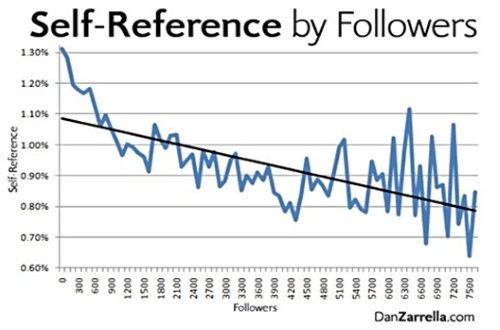
Or so says Zarrella. Using TweetPsyche data on more than 60,000 Twitter users, he looked at self-reference on Twitter. He found that Twitter users who don’t talk about themselves much tend to have more users.
“Want more followers?” Zarrella asks. “Stop talking about yourself.”
6. Spread yourself thin.
The more you tweet about yourself, the fewer retweets you’ll get.
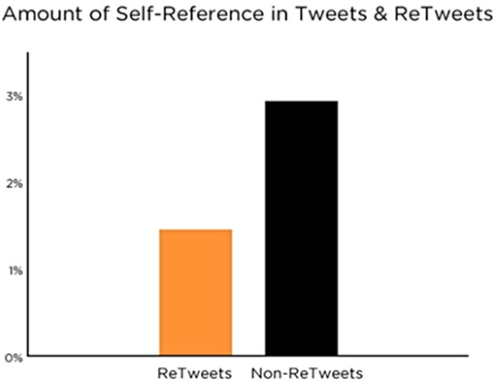
Zarrella compared tweets that had been retweeted with those that had not. Non-retweets had nearly twice the number of self-references as tweets that went viral.
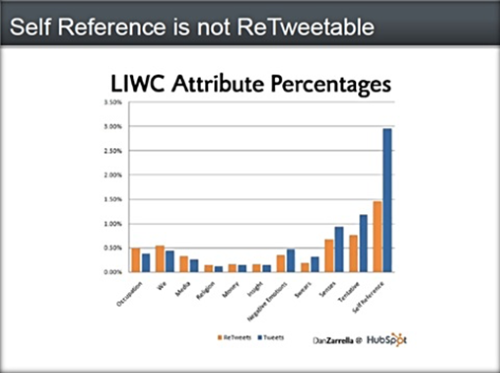
“I’m not on Twitter to hear about you and your life,” Zarrella writes. “I mean, unless we’re friends in real life, of course. I’m on Twitter to get information that will either benefit me, or help others (and by extension, benefit me). … So stop talking about yourself, and make content that others can relate to and get value from!”
7. Make it all about me on Facebook.
On the other hand, talking about yourself on Facebook actually increases engagement.
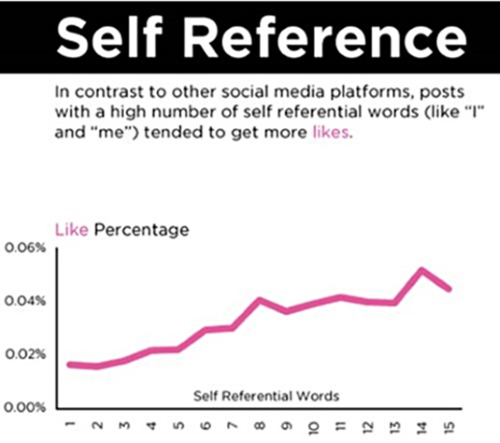
Zarrella learned that status updates with personal references (I, me) tend to get more likes than those without.
That’s in contrast with … well, every channel everywhere in the history of mankind. Usually, focusing on you, or writing to and about the reader, works better than self-reference.
Stop meforming.
One more finding from Zarrella: While you is the most retweeted word in the English language, me-focused words reduce retweets.
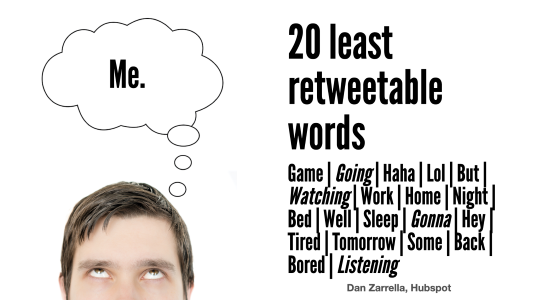
Among the least retweeted words in the English language: Answers to the original Twitter question, “Whatcha doing,” including “-ing” words, like “going,” “watching,” “listening.”
As in “I am.”
As in “me now.”
Sorry, “meformers”: We’re just not that into you.
On Twitter, as in so much more in life, better “you” than me.

A thousand times YES. And, of course, these lessons apply so well to press release and pitch writing. Specifically press release HEADLINES. If I see my company write another press release with a headline that STARTS with our company’s name, I’m gonna scream.